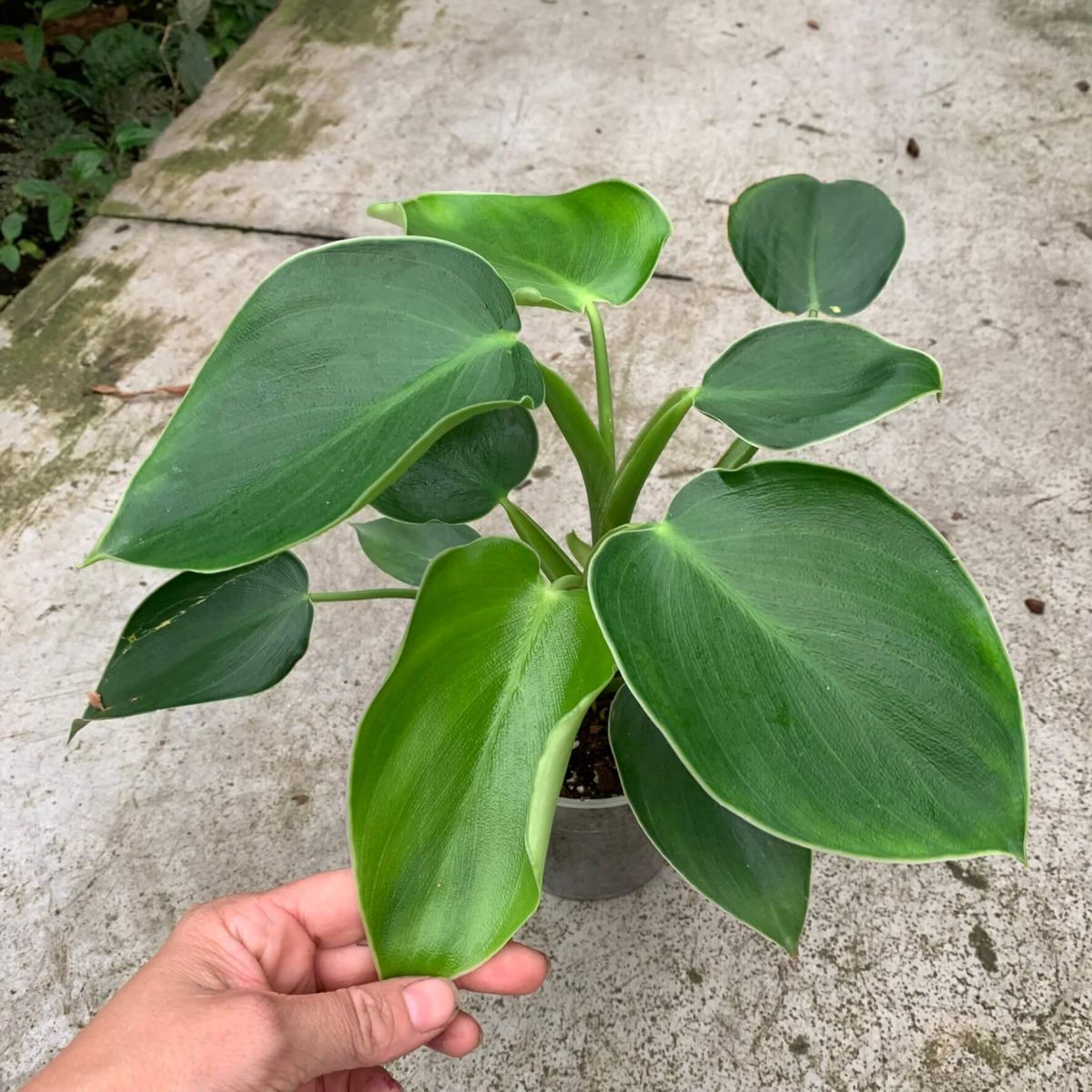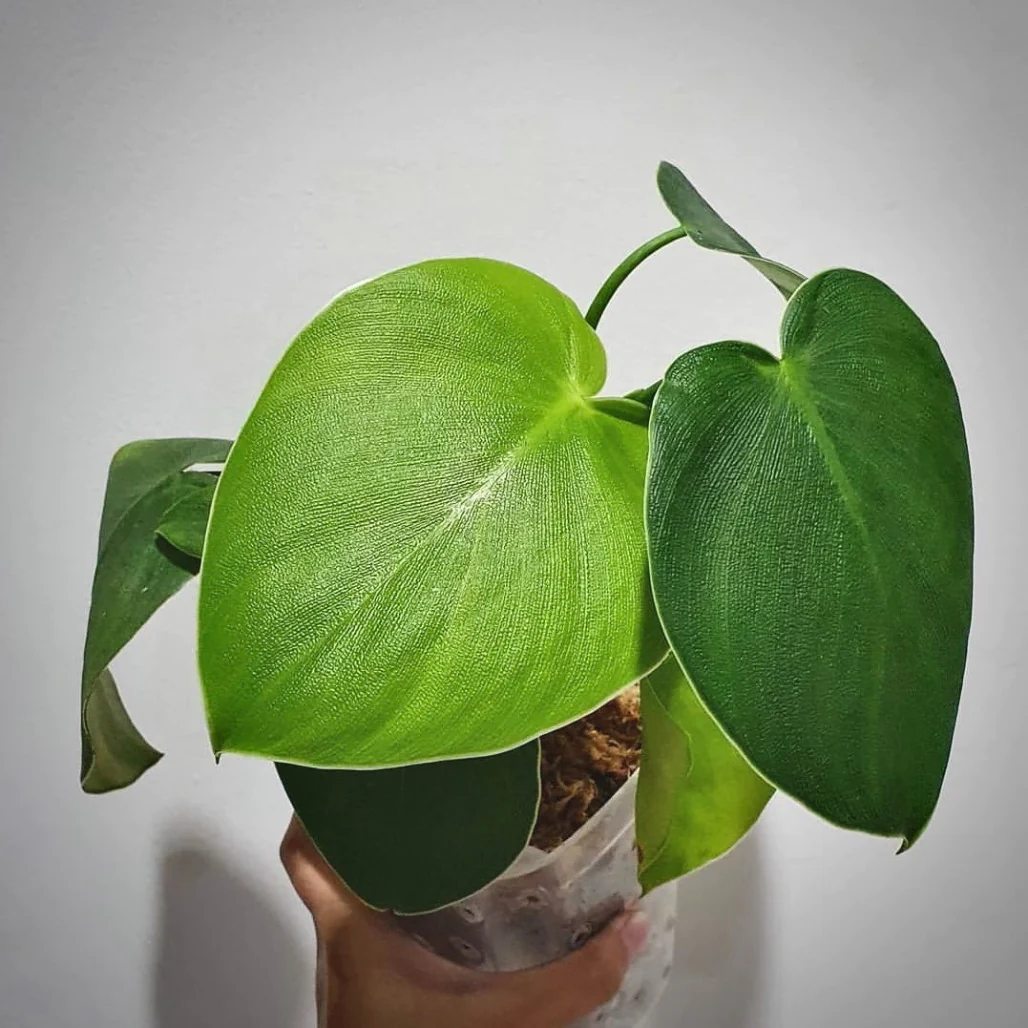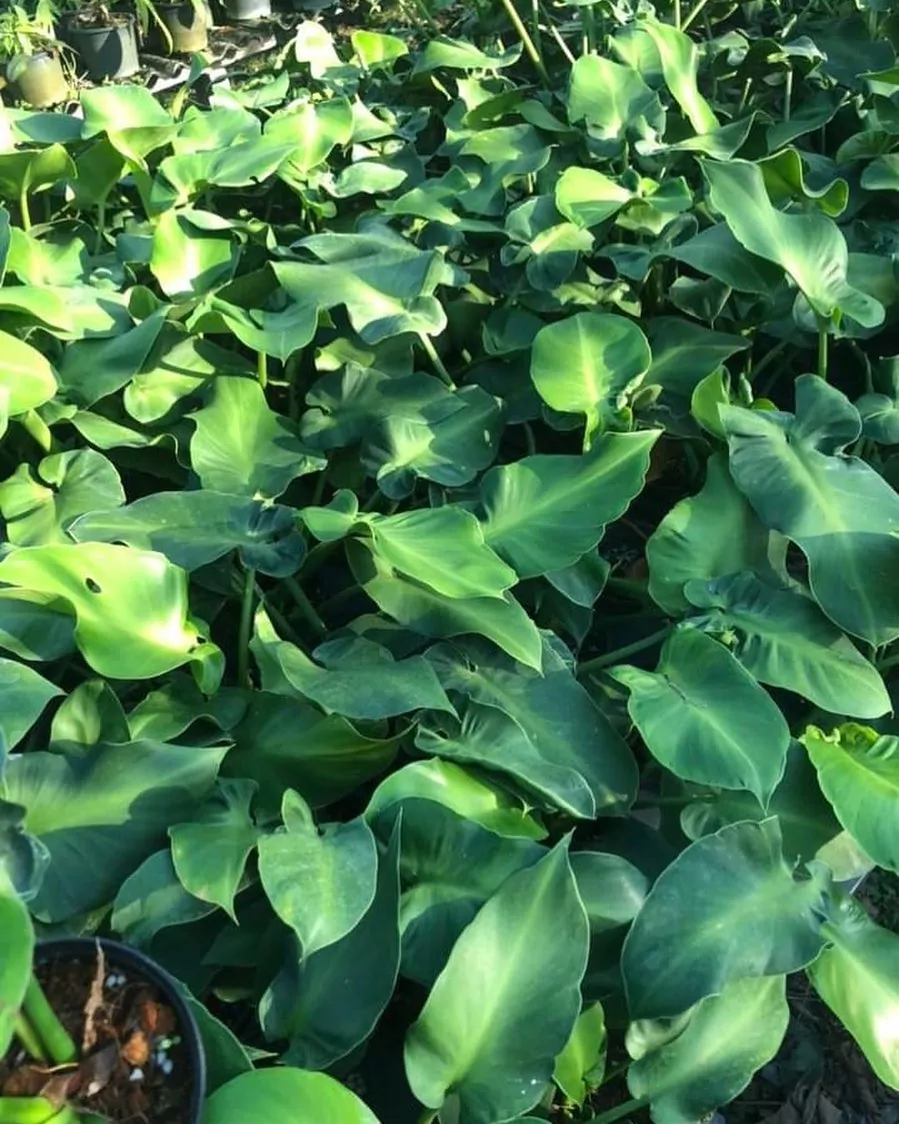Philodendron Rugosum: 5 Secrets to Perfect Growth
Philodendron Rugosum, often called the 'Pigskin Philodendron', is a distinctive tropical plant known for its textured, wrinkled leaves that resemble animal skin. It prefers a warm, humid environment with indirect, bright light and well-draining soil. To care for it, maintain consistent moisture without overwatering, provide regular misting, and use a balanced fertilizer during the growing season. In this blog post, we will share 5 secrets to achieving perfect growth with your philodendron rugosum houseplant.

The philodendron rugosum thrives in bright, indirect light. Unlike some philodendrons that tolerate lower light conditions, this species needs good light to encourage lush growth and prevent leggy vines. Here are some tips for providing the right light levels:
East or West Facing Windows
Position your philodendron near an east or west facing window where it will receive several hours of gentle morning or afternoon sun. Direct midday sun from a south window can scorch the leaves.
Sheer Curtains
If the light from an unobstructed window is too intense, hang sheer curtains to filter the direct sun. The curtains will allow plenty of bright light to pass through.
Rotate the Plant
Rotate your philodendron rugosum every few days so all sides receive equal light exposure. This prevents lopsided growth toward the light source.
With the right balance of bright, indirect light, your philodendron will produce lush, vibrant foliage. Insufficient light leads to sparse, small leaves and leggy growth as the plant reaches for the light.
Philodendron rugosum thrives in the warm, humid conditions of the tropical rainforest. Replicating these high humidity levels will keep your plant healthy and help it grow fast. To learn more about maintaining ideal humidity levels for your Philodendron, check out our in-depth guide. Here are some tips for increasing humidity around your philodendron:
Use a Humidifier
Run a humidifier near your philodendron to keep humidity consistently around 60-70%. Choose an evaporative or ultrasonic humidifier that releases cool mist.
Create a Pebble Tray
Place the pot on a tray filled with pebbles and water. As the water evaporates, it will provide localized humidity around the plant.
Mist Frequently
Mist your philodendron’s leaves every few days to boost hydration and wash away dust. Use room temperature filtered or distilled water to prevent leaf burn.
With proper humidity your philodendron will thrive. Low humidity can cause brown leaf edges, crispiness, and slow growth.
Philodendron rugosum prefers a fertile, well-draining potting mix that mimics tropical soil conditions. Here are some tips for choosing the right potting mix:
Purchase a Fertile Houseplant Mix
Look for a potting mix made for tropical plants, like an African violet mix. These blends contain rich organic matter to support lush growth.
Add Perlite or Bark
To improve drainage, amend potting mix with 30% perlite or small orchid bark pieces. This creates air pockets for better root respiration.
Refresh Every 2 Years
Re-pot in fresh potting mix every 2 years before the existing mix breaks down. Old potting mix won’t provide adequate nutrition or drainage.
Avoid soilless blends or potting mixes made for cacti or succulents. These fast draining mixes won’t retain enough moisture for your philodendron’s needs.

"Discover the unique beauty of Philodendron Rugosum! Click now to bring this exotic plant into your home and elevate your space with its elegant foliage. Don't miss out – your green oasis awaits!"
Philodendron rugosum prefers moist (but not soggy) soil at all times. Watering correctly prevents drought stress and encourages healthy growth. Here are some tips:
Check Soil
Insert a finger into the top few inches of soil. If it’s partly dry, it’s time to water. Allow the soil to fully dry out between waterings.
Water Until Drainage
Water thoroughly until excess starts to drain from the drainage holes at the bottom of the pot. This ensures the entire root zone is hydrated.
Adjust for Seasons
Water more often in summer when the plant is actively growing. Reduce watering frequency in winter during dormancy.
Avoid overwatering, which causes root rot, or underwatering, which leads to dropped leaves and crispy brown edges. Careful monitoring helps you determine the perfect watering schedule.

Good air flow around your philodendron rugosum prevents disease and encourages strong growth. Stagnant, still air can lead to fungal issues. Good air flow around your philodendron rugosum prevents disease. To understand the importance of air circulation for Philodendrons and how to achieve it, see our detailed insights in "The Ultimate Guide to Philodendron Care for Healthy and Vibrant Plants" Here are some tips:
Use a Fan
Run a small oscillating fan near your plant for several hours per day to keep air gently circulating. Point it away from the leaves to avoid damage.
Space Out Plants
Allow enough space between your philodendron and other plants for air to flow between them. Crowding causes humidity buildup.
Prune Strategically
Remove densely packed leaves or congested growth to open up air flow within the plant’s canopy. Focus on the inside and lower portions.
With proper air circulation, your philodendron will develop large, healthy leaves and avoid fungal problems like powdery mildew.
By following these 5 secrets to success, you can achieve a thriving philodendron rugosum with gorgeous crinkled foliage. Adjust its care to match your specific growing conditions, and this plant will flourish for many years as an easy-care houseplant.
The philodendron rugosum is a tropical plant that thrives with bright, indirect light, high humidity, well-draining soil, ample hydration, and good air circulation. Provide these key elements, and your philodendron will reward you with lush, vibrant growth and cascading vines. Monitor the plant’s needs, make adjustments as needed, and enjoy this gorgeous houseplant for years to come. With a little TLC, the philodendron rugosum’s wrinkled leaves will add lively texture to your indoor plant collection.
https://bit.ly/48El1af

Provide Bright, Indirect Light
The philodendron rugosum thrives in bright, indirect light. Unlike some philodendrons that tolerate lower light conditions, this species needs good light to encourage lush growth and prevent leggy vines. Here are some tips for providing the right light levels:
East or West Facing Windows
Position your philodendron near an east or west facing window where it will receive several hours of gentle morning or afternoon sun. Direct midday sun from a south window can scorch the leaves.
Sheer Curtains
If the light from an unobstructed window is too intense, hang sheer curtains to filter the direct sun. The curtains will allow plenty of bright light to pass through.
Rotate the Plant
Rotate your philodendron rugosum every few days so all sides receive equal light exposure. This prevents lopsided growth toward the light source.
With the right balance of bright, indirect light, your philodendron will produce lush, vibrant foliage. Insufficient light leads to sparse, small leaves and leggy growth as the plant reaches for the light.
Provide High Humidity
Philodendron rugosum thrives in the warm, humid conditions of the tropical rainforest. Replicating these high humidity levels will keep your plant healthy and help it grow fast. To learn more about maintaining ideal humidity levels for your Philodendron, check out our in-depth guide. Here are some tips for increasing humidity around your philodendron:
Use a Humidifier
Run a humidifier near your philodendron to keep humidity consistently around 60-70%. Choose an evaporative or ultrasonic humidifier that releases cool mist.
Create a Pebble Tray
Place the pot on a tray filled with pebbles and water. As the water evaporates, it will provide localized humidity around the plant.
Mist Frequently
Mist your philodendron’s leaves every few days to boost hydration and wash away dust. Use room temperature filtered or distilled water to prevent leaf burn.
With proper humidity your philodendron will thrive. Low humidity can cause brown leaf edges, crispiness, and slow growth.
Use a Well-Draining Potting Mix
Philodendron rugosum prefers a fertile, well-draining potting mix that mimics tropical soil conditions. Here are some tips for choosing the right potting mix:
Purchase a Fertile Houseplant Mix
Look for a potting mix made for tropical plants, like an African violet mix. These blends contain rich organic matter to support lush growth.
Add Perlite or Bark
To improve drainage, amend potting mix with 30% perlite or small orchid bark pieces. This creates air pockets for better root respiration.
Refresh Every 2 Years
Re-pot in fresh potting mix every 2 years before the existing mix breaks down. Old potting mix won’t provide adequate nutrition or drainage.
Avoid soilless blends or potting mixes made for cacti or succulents. These fast draining mixes won’t retain enough moisture for your philodendron’s needs.

"Discover the unique beauty of Philodendron Rugosum! Click now to bring this exotic plant into your home and elevate your space with its elegant foliage. Don't miss out – your green oasis awaits!"
Water When Partially Dry
Philodendron rugosum prefers moist (but not soggy) soil at all times. Watering correctly prevents drought stress and encourages healthy growth. Here are some tips:
Check Soil
Insert a finger into the top few inches of soil. If it’s partly dry, it’s time to water. Allow the soil to fully dry out between waterings.
Water Until Drainage
Water thoroughly until excess starts to drain from the drainage holes at the bottom of the pot. This ensures the entire root zone is hydrated.
Adjust for Seasons
Water more often in summer when the plant is actively growing. Reduce watering frequency in winter during dormancy.
Avoid overwatering, which causes root rot, or underwatering, which leads to dropped leaves and crispy brown edges. Careful monitoring helps you determine the perfect watering schedule.

Increase Air Circulation
Good air flow around your philodendron rugosum prevents disease and encourages strong growth. Stagnant, still air can lead to fungal issues. Good air flow around your philodendron rugosum prevents disease. To understand the importance of air circulation for Philodendrons and how to achieve it, see our detailed insights in "The Ultimate Guide to Philodendron Care for Healthy and Vibrant Plants" Here are some tips:
Use a Fan
Run a small oscillating fan near your plant for several hours per day to keep air gently circulating. Point it away from the leaves to avoid damage.
Space Out Plants
Allow enough space between your philodendron and other plants for air to flow between them. Crowding causes humidity buildup.
Prune Strategically
Remove densely packed leaves or congested growth to open up air flow within the plant’s canopy. Focus on the inside and lower portions.
With proper air circulation, your philodendron will develop large, healthy leaves and avoid fungal problems like powdery mildew.
By following these 5 secrets to success, you can achieve a thriving philodendron rugosum with gorgeous crinkled foliage. Adjust its care to match your specific growing conditions, and this plant will flourish for many years as an easy-care houseplant.
Conclusion
The philodendron rugosum is a tropical plant that thrives with bright, indirect light, high humidity, well-draining soil, ample hydration, and good air circulation. Provide these key elements, and your philodendron will reward you with lush, vibrant growth and cascading vines. Monitor the plant’s needs, make adjustments as needed, and enjoy this gorgeous houseplant for years to come. With a little TLC, the philodendron rugosum’s wrinkled leaves will add lively texture to your indoor plant collection.
https://bit.ly/48El1af
Nhận xét
Đăng nhận xét